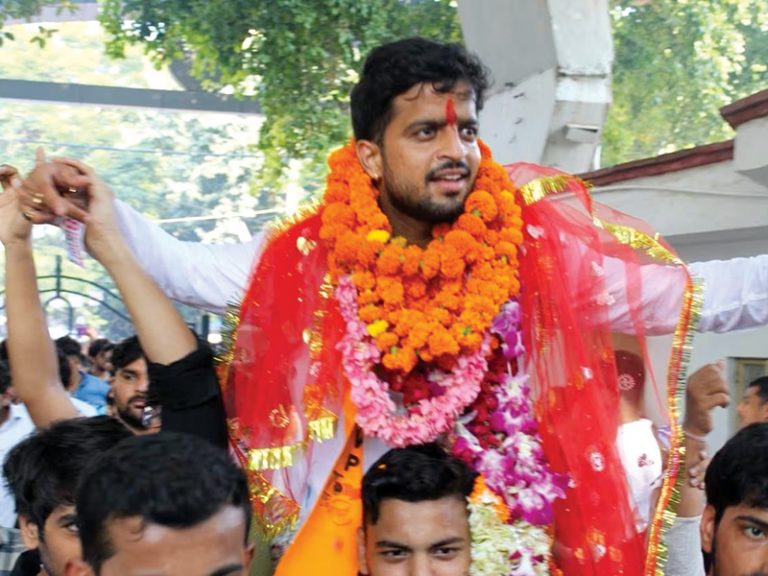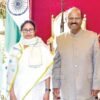No products in the cart.

Delhi: ABVP wins again
Autar Nehru (Delhi)

DUSU’s newly elected president Tushar Dedha: subsidies priority
Held on september 22 after a hiatus of three years because of Covid disruption, the Delhi University Students Union (DUSU) election was swept by the BJP-affiliated Akhil Bharatiya Vidyarthi Parishad (ABVP) which bagged three out of four office-bearer posts. The Congress-affiliated National Students’ Union of India (NSUI) won only the post of vice-president. Students of Delhi University’s 80 affiliated colleges and 16 university faculties were eligible to vote.
ABVP won the post of president for the eighth time in the past 11 years with ABVP president Tushar Dedha polling 23,460 votes and NSUI’s Hitesh Gulia 20,345. “I congratulate all the karyakartas of ABVP for their emphatic victory in #DUSUElection2023. This triumph shows the ubiquitous acceptance of the ideology of ‘nation first’ among our young generation,” tweeted BJP national president J.P. Nadda.
Arguably the world’s largest students union election with over 1.5 lakh voters, DUSU elections are a prize target for all political parties. For several decades after independence, DUSU was the preserve of Communist and Left-affiliated parties. But in the decade past after the BJP swept to power at the Centre in 2014 and again in 2019, the BJP-affiliated ABVP’s star has been in the ascendant.
All major political parties accord high importance to college and university students unions. Not only are they a sizeable vote bank, they are also a catchment pool for future leaders. For instance, the former BJP finance minister the late Arun Jaitley, was a former DUSU president. Moreover, students of affiliated unions can be gathered for protest marches or agitations at short notice. That’s why the expenditure ceiling of Rs.5,000 per candidate prescribed by the Lyndogh Committee (2005) is practiced more in the breach than observance, as political parties pour money into students union elections to ensure affiliated unions and candidates are elected.
The quid pro quo that college and university students extract from political parties is heavy subsidisation of higher education. Students’ tuition and residential accommodation fees in public universities and colleges are a thorny subject that no political party dares touch. For instance, tuition fees in Delhi University and affiliated colleges have remained frozen for decades. In the postgrad Jawaharlal Nehru University (JNU) where the Communist-aligned Left United (alliance of all left associations) rules the roost, tuition fees for arts grads average Rs.400-450 per year and hostel fees in the heart of Delhi’s green zone are less than Re.1 per night.
“The main objective of candidates who contest DUSU and other university elections is to ensure that tuition and residence fees remain frozen at 1960 levels. Well aware of the destructive power of students unions, no political party or government dares to raise their fees except nominally. Similarly, faculty unions in colleges and universities make sure their remuneration is on a par with senior civil servants and high court judges. Tuition fees in India’s higher education institutions contribute barely 5 percent of institutional expenditure against the global average of 20 percent, and no scheme of repaying the cost of higher education when graduates start working has ever been mooted. Post-independence India’s higher education subsidy swallows 40 percent of the Centre and states’ annual education budget at the expense of primary education. It’s iniquitous,” says a senior JNU faculty member, who requested anonymity for fear of “lynching” by student union activists.
Predictably in his victory speech, DUSU’s newly-elected president Tushar Dedha, a first-year student of MA in Buddhist Studies, spelt out his priorities. “Metro concession passes, better hostel facilities for students and various other issues are our priority. We will work on all issues of students,” he promised. Currently, although university students are entitled to heavily concessional monthly bus passes in Delhi, they haven’t been awarded concessional fares by the metro rail system despite it being “the most used public transport mode by students,” as demanded by all DUSU candidates in their manifestos. “Also, as the hostels were closed for almost three years because of the Covid pandemic, infrastructure including piping and drainage needs repair,” says Dedha.
Meanwhile political and media pundits in the national capital are reading the tea leaves to guess if the DUSU election results are a pointer to the General Election scheduled for early next year. Despite the BJP-affiliated ABVP candidates having secured three of the four top posts, Congress has claimed it is advancing because it prevented an ABVP sweep.
According to Yashwant Deshmukh, founder-director of CVoter, an election research agency, one cannot ascertain the gains of Congress without understanding where its votes came from. “If the NSUI’s margin of loss reduced after receiving votes from ABVP’s bank, it is a gain. But if it gained from (left) parties like AISA or SFI, then it’s technically a loss, because ABVP still has a stronger, untouched vote base,” says Deshmukh, quoted by online portal Quint (Sept 25).
If at all the DUSU elections are an indicator of things to come at the hustings next year, it is that the communist and left parties are continuously losing ground. And BJP is winning it.















Add comment